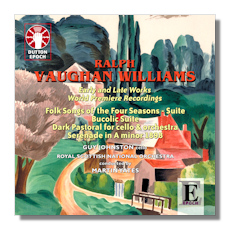
The Internet's Premier Classical Music Source
Related Links
- Vaughan Williams Reviews
- Latest Reviews
- More Reviews
-
By Composer
-
Collections
DVD & Blu-ray
Books
Concert Reviews
Articles/Interviews
Software
Audio
Search Amazon
Recommended Links
Site News
 CD Review
CD Review
Ralph Vaughan Williams

Early and Late Works
- Folk Songs of the Four Seasons - Suite (1949)
- To the Ploughboy and May Song
- To the Green Meadow and an Acre of Land
- The Sprig of Thyme and the Lark in the Morning
- The Cuckoo
- Wassail Song and Children's Christmas Song
- Bucolic Suite (1900/1)
- Dark pastoral for Cello & Orchestra
- Serenade in A minor (1898)
Guy Johnston, cello
Royal Scottish National Orchestra/Martin Yates
Dutton Epoch CDLX7289 71:20
These are all works that Vaughan Williams either did not see fit to publish or which he was unable to finish before he died in 1958. None of them disgrace his memory in the least, however. There is much delightful music on this disc.
In order of composition, the last piece on the disc came first. In 1898 Vaughan Williams was in Berlin, two years after leaving the Royal College of Music, and one year after marrying Adeline Fisher. In addition to writing this Serenade (edited from the manuscript by Julian Rushton in 2011), he was working on a doctoral work which later became the Cambridge Mass, and taking lessons with Max Bruch. The Serenade, his first orchestral work, was played in 1901 and withdrawn by the composer in 1908 after a performance in London. The orchestration is good. The nine-minute Romance was added later and Vaughan Williams intended to delete the Trio in the previous movement. In the opening movement there is a moment that sounds a bit like Tchaikovsky followed by some Dvořák-like melody, something I heard before reading that Adeline noted this in a letter. The Scherzo, with a motif tossed around from instrument to instrument, I found delightful, and there is nice melody in the Intermezzo. The Romance includes some birdsong imitation on the oboe, which Lewis Foreman attributes to Vaughan Williams attendance at a performance of Siegfried shortly before writing it. The vigorous Finale unleashes the full orchestra in a march ending with a drumroll.
The Bucolic Suite (edited from the manuscript by Julian Rushton in 2011) was first performed in 1901 and, prior to the current performance, last played in 1907. The orchestra here is larger than the chamber orchestra specified for the Serenade. In four movements, it runs nearly twenty minutes. The first movement opens with just a bit of country fiddling, which is soon left behind. The six minute Andante is lovely, some of it exquisite. The quiet and lightly scored Intermezzo (Allegretto) has some catchy melody. The lively, even perky finale begins with a brief near-fanfare, and at the end its melodic course swells with the full orchestra.
The Folk Songs of the Four Seasons, in five sections, most of which use the themes of more than one song, was written in 1949 and edited by Roy Douglas in 1952. It is longer, and some will find it more appealing than the English Folk Song Suite, in three movements, of which the first and last are marches. This later suite of folk songs was originally written for female chorus, but edited for just orchestra after the original "did not catch on," as the commentator puts it. The first two sections are lively and upbeat. The middle one, first Andante sostenuto and then Moderato tranquillo, is quieter, with lighter textures. A single, very high violin is heard at midpoint and then the high strings are heard above the midrange strings. The brief "Cuckoo," Andante sostenuto, seems to betray its title, to my ears. The tunes in the final movement are very familiar, though.
Douglas worked closely with Vaughan Williams in his last years and he published a memoir about that, in which he discussed finding the unfinished manuscript of a Concerto for Cello and Orchestra, written during the Second World War. Douglas and Ursula Vaughan Williams, Ralph's widow, after conferring, decided that the work should be left in manuscript. However, the composer David Mathews recently decided to work with a completed four minute section of the slow movement and he finished the movement in the style of Vaughan Williams, mostly basing his additions on the opening section, "with some new material in the middle," according to notes by Lewis Foreman. As Dark Pastoral (completed and orchestrated by David Matthews in 2009), the work was played at the Proms on September 9, 2010 and an excerpt can be found on YouTube.
Highly recommended for anyone who cares for the music of Vaughan Williams.
Copyright © 2012, R. James Tobin





















